Narsi Mehta composed the famous ‘Vaishnav jana to’ bhajan
Saint Narsi (Narsinh Mehta) was ardent devotee of Krushna, always engrossed in singing bhajans in His praise. Saint Narsi was particularly fond of the ‘Kedar’ raga. The raga Kedar when sung by him, brought him communion with ShriKrushna. ShriKrushna also would be pleased and mesmerized when Narsi sang bhajans in ‘Kedar’. Once a Brahmin came to Narsi’s home. He was worried about the expenses in his daughter’s marriage. He knew Narsi was a supreme devotee and would surely help him. Narsi asked him how much money he wanted. Hesitatingly Brahmin replied that he needed 500 rupees. Narsi went to a money lender. The money lender asked Narsi for something as security against the loan. The shrewd money lender had heard about his famous raga Kedar and hence suggested that Narsi could keep ‘Kedar’ as mortgage. Narsi agreed, as it was the only valuable asset he possessed. The thought that, he would be unable to sing in ‘Kedar’ and hence the happiness of communion with ShriKrushna would be lost, did not even come in selfless Narsi’s mind. Narsi said ,”I will keep my Kedar raga as mortgage but please give the Brahmin the money he wants”. The money lender imposed a condition that Narsi shouldn’t sing in ‘Kedar’ till all the money was paid with interest. The Brahmin’s daughter’s wedding took place without further incident.
Although Narsi continued with other bhajans, without ‘Kedar’ he couldn’t find peace. He was unable to bear separation from ShriKrushna. Days went by but the Brahmin didn’t repay the loan. Narsi wanted to release ‘Kedar’ from money lender as soon as possible. However, his mind couldn’t find peace till the raga ‘Kedar’ was released from the money lender. At the same time, some envious people raised questions on Narsi’s devotion and went to the king.
King called for Narsi and it was decided that Narsi should undergo a test to prove his devotion. An idol of ShriKrushna, with a garland in hand was placed in the central hall. The test was that Narsi should sing his bhajan in front of that idol and it should become alive and put the garland around his neck. If this did not take place within the allotted time the accusations against him would be considered true. Narsi was stable and said, “Whatever is ShriKrushna’s wish will happen’. Narsi sat before the idol and started singing bhajans.
Neither was it impossible for ShriKrushna to come for his devotee nor was Narsi’s bhakti so superficial that ShriKrushna would not appear without listening to ‘Kedar’. The minutes turned to hours. The moment of decision was near and the enemies were hopeful of Narsi’s defeat.
At the same time, a miracle happened in the city. There was a knock at money lender’s door. He heard Narsi’s voice requesting to open the door. The money lender welcomed Narsi. Narsi paid the principal amount and interest. He apologized for returning the money late and asked the money lender to immediately give him the receipt that now raga ‘Kedar’ is free. Money lender took the money and gave Narsi the receipt.
Here in the palace Narsi opened his eyes and saw ShriKrushna’s idol. To his surprise the receipt of loan payment fell in his lap. His happiness knew no bounds. Kedar raga was freed. Narsi began to sing in ‘Kedar’.
The atmosphere was filled with divinity and a beam of light surrounded ShriKrushna’s idol.The enemies were shocked. Tears started flowing from Narsi’s eyes. The idol turned alive and moved ahead to place the garland around Narsi’s neck. Pleased with the melodious ‘Kedar‘ and the sincere devotion ShriKrushna came to his rescue and vanished soon after putting the garland in his neck. Thus, Narsi was able to establish himself as a true devotee.

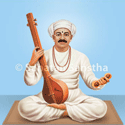 You Can Attain God Through Sacrifice
You Can Attain God Through Sacrifice Ramakrishna Paramahamsa devotion
Ramakrishna Paramahamsa devotion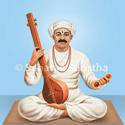 Deity Pandurang’s affection for his devotees
Deity Pandurang’s affection for his devotees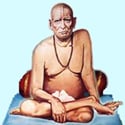 Saints Omniscience
Saints Omniscience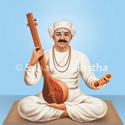 Saint Tukaram’s sixth sense
Saint Tukaram’s sixth sense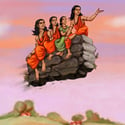 Story of Sant Dnyaneshwar Maharaj and yogi Changdev
Story of Sant Dnyaneshwar Maharaj and yogi Changdev